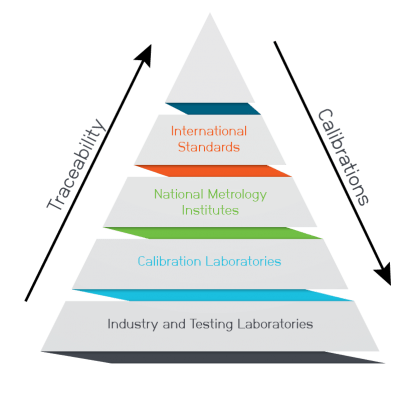联系我们
与泰克代表实时聊天。 工作时间:上午 9:00 - 下午 5:00(太平洋标准时间)。
致电我们
工作时间:上午9:00-下午5:00(太平洋标准时间)
下载
下载手册、产品技术资料、软件等:
反馈
NIST 溯源:确保测量精确性
-
NIST 的职责:NIST 维护国际单位制 (SI) 的七个基本单位的国家标准,这些标准受 ISO/IEC 17025 等标准的管理。
-
校准溯源:NIST 溯源校准涉及到对测量过程进行全面记录,并根据 NIST 特别出版物 250 将一系列校准与指定的参考标准相关联。
-
泰克校准:泰克在美国境内进行的校准可溯源至 NIST,符合 ISO 9001 和 ISO/IEC 17025 标准。这些校准均按照 NIST 标准进行,以确保测量精确性。
-
国际校准:在美国境外完成的校准可溯源至相关国家计量机构,遵守 ISO/IEC 17025 等国际标准。
计量溯源
计量溯源是指可通过完整校准链(包括测量不确定度的测定)与指定参考标准相关联的测量结果。 它是测量仪器的测量结果与测量标准值之间存在关系的基本保证。泰克标准可直接溯源至国际单位制 | NIST,这是使用最广泛的国际单位制,用于定义米、千克、秒、安培、开尔文、摩尔和坎德拉等单位。


溯源如何影响全球市场
测量结果可溯源至国际单位制 (SI),这使实现全球贸易市场所需的准确度、精确度和互换性成为了可能。为了提供真正标准化的组件,行业需要可靠、一致并可溯源至公认计量系统(如国际单位制)的测量结果。
符合 ISO 标准
对于必须遵守或遵循国际标准化组织 (ISO) 标准要求的公司来说,溯源尤为重要。ISO 标准通常要求测试、测量和控制设备可溯源到公认的国家或国际标准。其他组织可能会自愿遵守 ISO 要求,以便声称其产品符合 ISO 标准。这种合规性通常表明组织对服务和/或质量的承诺。

NIST 溯源校准常见问题
什么是 NIST 溯源标准?
NIST 追溯校准可证明相关实验室或制造商具备按照美国国家标准与技术研究院 (NIST) 标准校准设备所需的条件和能力,以及该制造商的产品符合 NIST 所维护的测量标准。
为什么 NIST 溯源校准很重要?
NIST 溯源校准确保经认证的仪器执行的任何测量都具有完整的测量链,可溯源到 NIST 所维护的标准。测量链每一步都记录了已知的不确定性,并制定了解决这些不确定性的质量保证计划。
NIST 代表什么?
美国国家标准与技术研究院是美国商务部下属的一个联邦机构,负责制定和维护国家测量标准,并记录其参考标准的溯源。
哪些类型的实验室设备需要校准?
-
数字万用表 (DMM):工程师通常使用万用表来测量电压、电流和电阻。对它们进行校准可确保电气测量的准确性。
-
示波器:示波器对分析电气信号至关重要。校准是保持波形保真度的必要条件。
-
压力表:在工程实验室中经常会进行压力测量。无论是模拟还是数字压力表,都需要定期校准。
-
温度传感器和温度计:校准温度传感器和温度计对于保持准确的温度测量至关重要,尤其是在研究和质量控制实验室中。
-
流量计:流量计应用广泛,如用于流体动力学实验。定期校准对于确保精确的流量测量至关重要。
-
质量天平和称重秤:工程师经常需要进行精确的质量测量。天平和秤需要校准才能提供准确的重量读数。
-
力和扭矩传感器:机械和材料测试实验室会使用力和扭矩传感器。校准可确保精确地测量力和扭矩。
-
气体分析仪:处理气体分析(如环境监测或化学分析)的实验室会使用气体分析仪,需要对其进行校准才能读取准确的气体浓度读数。
-
pH 计:在化学和生物实验室中,需要校准 pH 计才能确保准确测量各种溶液的 pH 值。
-
尺寸测量工具:包括制造和工程领域中进行精密测量所使用的卡尺、千分尺和高度规等工具。
-
分光光度计:进行化学分析和材料表征的实验室会使用分光光度计,需要对其进行校准才能进行准确的吸收和透射测量。
-
环境监测设备:用于监测湿度、空气质量和辐射水平等参数的仪器需要定期校准才能保持数据的准确性。
-
振动分析仪:在机械和结构工程领域中,会使用振动分析仪来评估机械和结构。对其进行校准可确保获得可靠的振动数据。
-
电能分析仪:在电气工程和能源监测领域中,电能分析仪需要校准才能提供准确的电能质量和能耗数据。
-
气相色谱仪:在化学和化工实验室中,需要校准气相色谱仪才能确保精确的化合物分离和分析。
-
显微镜:在生物和材料科学实验室中,用于研究和分析的显微镜需要进行校准才能保持图像的清晰度和准确性。
认可校准与溯源校准的区别是什么?
认可校准是指校准实验室已获得第三方组织的认可,有能力提供认可范围内指定的校准服务。溯源校准是指校准的测量结果可溯源至 NIST 标准。
校准的有效期限有多长?
校准的有效期限取决于校准对象。对于大多数设备,包括示波器、DMM 和频谱分析仪,建议的校准间隔为 12 个月左右。通过结合统计分析、历史数据和行业标准,并考虑设备关键性、测量精度和成本效益等因素,来确定电气设备的最佳校准间隔,从而在精度和成本之间取得平衡。详细了解如何使用威布尔分析计算校准间隔。


